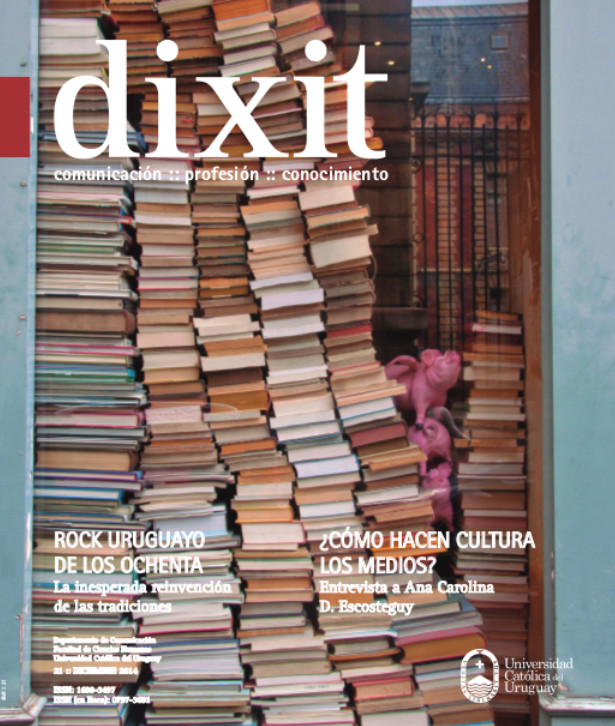Uruguayan rock in the eighties: traditions unexpectedly reinvented
DOI:
https://doi.org/10.22235/d.v0i21.396Keywords:
Uruguayan rock, punk-rock, youth culture, eighties, cultural studiesAbstract
Evidences of musicians from the Eighties indicate that they played music in the same stages than musicians of the prior generation. Such a contact – that was conflictive occasionally – allowed the new musicians to build an idiosyncratic generational identity, and challenges the idea that the rock of the Eighties in Uruguay would have been born without artistic parents, as stated in the musical critic reviews of the time. This article examines, first, how critical reviews and chronicles contributed to the building of an eloquent discourse for the new youth subculture. Second, it questions the idea of orphanhood describing how musicians and journalists rejected and resignified certain elements of existing cultural tradition thus making the rock from the Eighties the defining cultural element of the decade.
Downloads
References
Aguiar, S., Sempol, D. (2014). Ser joven no es delito. Transición democrática, razzias y gerontocracia. Montevideo: mimeo.
Álvarez Ferretjans, D. (1985). La prensa en el período de la transición. Montevideo: El Libro Libre.
Baltar, G. (2007). La celebración del cadáver. La generación de los 80: ¿dónde estabas tú? 45RPM, 7. Recuperado de http://www.45rpm.com.uy/200711/08.htm
Baltar, G. (1984, octubre 20). Los órganos están bien: recital de Los Estómagos. La Semana, 295, El Día.
Bayce, R. (1989). Cultura política uruguaya. Desde Batlle hasta 1988. Montevideo: Fundación de Cultura Universitaria.
Bukowski, C. et al. (1988). Amasijo habitual. Montevideo: Ediciones del Somorgujo.
Butazzoni, F. (1990). Una visión cultural del Uruguay de los ochenta. Zemelman, H. (Coord.). Cultura y política en América Latina. México: Siglo XXI.
Capagorry, J., Rodríguez Barilari, E. (1980). Aquí se canta. Canto popular. Uruguay 1977-1980. Montevideo: Arca.
Carbone, A., Forlán Lamarque, R. (1987). Fuera de control. Montevideo: Forum Gráfica Editora.
Casanova, G. (1988). Mamá era punk. Montevideo: CEMA. Recuperado de http://www.youtube.com/watch?v=l822azA0cXg
Clarke, J., Hall, S., Jefferson, T., Roberts, B. (2003). Subcultures, cultures and class. Hall, S., Jefferson, T. (Eds.). Resistance through Rituals: Youth Subcultures in post-war Britain. Working Papers in Cultural Studies 7/8. The Center for Contemporary Cultures Studies. University of Birmingham: Routledge.
Da Silveira, C. (1984). En la tele. Jaque, 16, 19.
Da Silveira, C. (1984). Empujando la puerta. Jaque, 45, 21.
De Certeau, M. (1998). The practice of Everyday Life. Storey, J. (Ed.). Cultural Theory and Popular Culture: A Reader. Essex: Pearson-Prentice Hall.
Delgado, L. (2014). Los ochenta: la década de los senderos que se bifurcan. Cuadernos de Historia de la Biblioteca Nacional, 13. Montevideo: Biblioteca Nacional. En prensa.
Frank, T. (1997). The Conquest of Cool: Business Culture, Counterculture, and the Rise of Hip Consumerism. Chicago: Chicago University Press.
Geertz, C. (1988). La interpretación de las culturas. Madrid: Gedisa.
Guinovart, R. (2012). La amnistía en Jaque, la construcción del discurso de la transición democrática [ponencia]. XI Congreso Latinoamericano de Investigadores en Comunicación. Montevideo, mayo. Recuperado de http://alaic2012.comunicacion.edu.uy/sites/default/files/gt14_guinovart_raquel_1.pdf
Guinovart, R. (2014). Jaque: entre la ideología y el partido. Cuadernos de Historia de la Biblioteca Nacional. Montevideo: Biblioteca Nacional. En prensa.
Hall, S., Jefferson, T. (eds.) (2003). Resistance through Rituals: Youth Subcultures in post-war Britain. Working Papers in Cultural Studies 7/8. The Center for Contemporary Cultures Studies. University of Birmingham: Routledge.
Hardy, P., Lang, D. (1990). The Faber Companion to 20th. Century Popular Music. Londres: Faber and Faber.
López, V. (2012). Reflexión sobre la aplicabilidad de los conceptos subcultura y contracultura elaborados por el Centro de Estudios Culturales de Birmingham en el estudio del underground porteño de los años 80 [ponencia]. XI Congreso Latinoamericano de Investigadores en Comunicación. Montevideo, mayo. Recuperado de http://alaic2012.comunicacion.edu.uy/sites/default/files/gt11__lrpez_soledad.pdf
Lourenço, V., Masi Pietroroia ,W. (2007). Un poco de historia. Guía del rock nacional. Recuperado de http://guiadelrocknacional.blogspot.com
Lyotard, J. (2004). The postmodern condition: a report on knowledge. Drolet, M. (Ed.). The Postmodernism Reader. Nueva York: Routledge.
Marcus, G. (1993). Rastros de carmín: una historia secreta del siglo XX. Madrid: Anagrama. Meridiano Juvenil (s/f). Recuperado de http://www.meridianojuvenil.com/page/2/
Maffessoli, M. (1990). El tiempo de las tribus. Barcelona: Icaria.
Nattero, V. (2002). Viviendo en Uruguay, en Rock uruguayo 80: la página del rock nacional ochentero. Recuperado de http://www.freewebs.com/rockuruguayo80/Nattero.htm [ 26 de agosto de 2012].
Pasarisa, E. (2014). 30 años es rabia: Polenta, pionera del hard rock vuelve al escenario, La Diaria. Montevideo. Recuperado de http://ladiaria.com.uy/articulo/2014/5/30-anos-es-rabia/
Peláez, F. (2002). De las cuevas al Solís, 1960-1975: cronología del rock uruguayo. Montevideo: Perro Andaluz.
Perelli, C., Rial, J. (1986). De mitos y memorias. La represión, el miedo y después... Montevideo: Banda Oriental.
Peveroni, G. (s/f). Rock que me hiciste mal. Henciclopedia. Recuperado de http://www.henciclopedia.org.uy/autores/Peveroni/RockUruguayo.htm
Pujol, S. (2005). Rock y dictadura: crónica de una generación (1976-1983). Buenos Aires: Emecé.
Restuccia, L. (1981). Opa y Rada en Montevideo. Emoción, reencuentro y... música. Audio Técnica, 17. Recuperado de UruRock. El rock uruguayo de los 70s, http://www.ururock.com/notas/opa.html
Rodríguez, M. (2012). En la noche: el rock uruguayo postdictadura (1982-1989). Montevideo: Fin de Siglo.
Roszak, T. (1970). El nacimiento de una contracultura: reflexiones sobre la sociedad tecnocrática y su oposición juvenil. Barcelona: Kairós.
Downloads
Published
How to Cite
Issue
Section
License
Copyright (c) 2014 Dixit

This work is licensed under a Creative Commons Attribution-NonCommercial 4.0 International License.
From issue number 32 onwards all contents are licensed under the Creative Commons Attribution 4.0 International License (CC BY 4.0).
Issues number 29-31 are licensed under the Creative Commons Attribution-NonCommercial 4.0 International License.
The contents corresponding to number 28 and earlier editions are under the Creative Commons Attribution-NonCommercial-ShareAlike 4.0 International License.


















